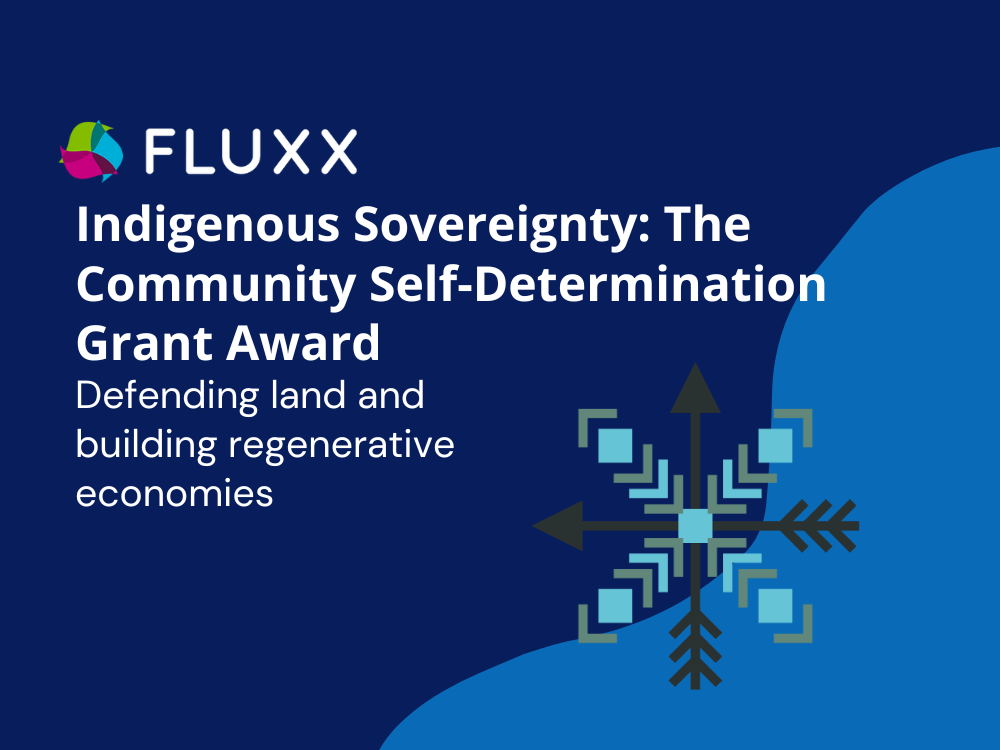Collective Action in 2020 – These 5 Tips Can Help
The collective action approach was developed because funders knew they needed to do more. Here are five straightforward tips that can help with that...
Be the first to know about new Fluxx grants management resources, blog articles and podcasts.


In a universe where decisions are all too often imposed on Indigenous peoples, the Community Self‑Determination Grant at NDN Collective is the ultimate reversal. The grant is literally designed to support Tribal Nations, Indigenous nations, and Indigenous-affiliated organizations with the resources and freedom to drive regenerative change on their own accord. With a mandate built around justice, equity, and Indigenous self-determination, the program invests the aforementioned projects, among others, that defend, develop, and decolonize.
Through multi-year, adaptable grants, NDN Collective demonstrates confidence that the communities it serves will determine how to prioritize, protecting land, building regenerative economy, revitalizing languages, or individual and family wellness.
The Community Self‑Determination Grant is among the leading grants offered by NDN Collective. Its main point is to construct collective power among Indigenous peoples at Turtle Island (North America) and associated island nations through enabling the provision of support to organizations and societies toward sovereign work.
Grant applications must comply with at least one among these thrice-pillars:
Flexible Use of Funds: Beneficiaries can spend grant funds on general support for operations, power-building, capital, or program-related projects.
Grant Term & Size: Generally, grants last for up to two years. Awards were up to $125,000 per year in 2024, for two years total, $250,000.
Focus on Grassroots Leadership: Although national campaigns are qualified, NDN Collective supports ground-up, Indigenous-driven initiatives that are place-based.
Power-building & Community Engagement: Grantees are invited to orientation, learning spaces, and power-building circles led by NDN staff.
Reporting Requirements: Two comprehensive reports are needed to be submitted within the grant duration: mid-term and end-term reports.
Eligibility is built around Indigenous leadership and community engagement. Applicants are generally:
NDN Collective means "Indigenous-led" to include Indigenous people in main decision-making positions on the board, leadership groups, or governing bodies.
Groups that are living in the United States, Canada, Mexico, Hawai‘i, Puerto Rico, American Samoa, Guam, the United States Virgin Islands, and the Northern Mariana Islands are qualified.
For institutions that are not entirely Indigenous-driven, NDN supports candid discussion within applications and an explicit agenda toward further Indigenous leadership.
Applicants start by registering through NDN Collective’s grants portal. Registration commonly comes before the window for the full application.
Applicants are requested to give:
NDN Collective screens proposals with a focus on Indigenous sovereignty, community engagement, and alignment with the principles of the decolonial.
Some grant winners participate in the onboarding workshops and learning circles that help develop common strength among movements.
The grantees must also present mid-term and terminal reports that outline progress, learned lessons, and financial stewardship.
NDN Collective supports an anecdotal reporting style, enabling the grantees to set the terms for what is successful.
Differently from classical philanthropy, this grant enables Indigenous people to own the process for themselves. It forswears model-building through grants and acknowledges that the nearest to the problems are nearest to the solution.
Not many grant opportunities grant unrestricted funds, fewer, still, over several years. The versatility of this grant enables organizations to fund salaries, construct infrastructure, or conduct strategic planning. It’s for staying the course, not for showing results.
Projects under the "Decolonize" category are frequently:
These are critical to recovery and long-term cultural sustenance and this grant undergirds them not as “baked goods,” but at the heart of Indigenous flourishing.
Within the "Defend" and "Develop" columns, the grantees can be tackling:
These projects synthesize age-old wisdom and contemporary science to conserve ecosystems and promote the well-being of people.
If future application windows become available, try these strategies:
NDN Collective has also stated that the Community Self‑Determination Grant will not necessarily include an open call in 2025. The grant will rather be directed at return or existing grantee-partners.
Yet this move also indicates the larger strategy for the long-term relationship-building and further investment for movement from NDN. The organizations are invited to remain up to date, to enroll for updates, and to get active with other NDN projects, for example, the Collective Abundance Fund.
The Community Self‑Determination Grant is an example of how grantmaking must come to the other side, not simply through the size of grants, but through relationship, value, and power-sharing. Trust that Indigenous communities know the direction that is best for themselves, and the result is not grant awards, but a movement.
For Indigenous-driven organizations, tribal government, and grassroots movements, this grant is not only a chance, it is an opportunity to dream bigger, to lead bolder, to build the future the way they want it.
For more information or to find updates on the Community Self‑Determination Grant check out NDN’s website.
The collective action approach was developed because funders knew they needed to do more. Here are five straightforward tips that can help with that...
Earth Day is a double-edged sword in the philanthropy space. On the one hand, it’s a time to celebrate and honor our planet and the incredible...
Learn how the Kauffman Foundation supports coalitions to close economic mobility gaps through its Collective Impact Grant, including eligibility,...
Be the first to know about new Fluxx grants management resources, blog articles and podcasts.